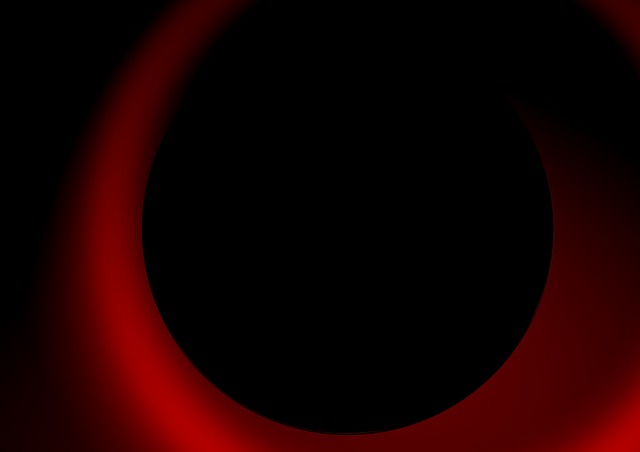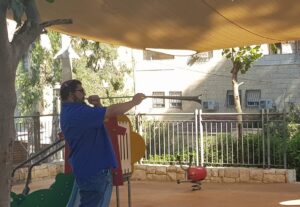In modern days, many traditional Jews’ only experience of musical instruments in liturgical practice is the shofar on Rosh haShanah. But this was not always the case. In the Temple era, every new moon, festival, and Sabbath was marked with the blowing of ḥatsotsrot ha-kesef, silver natural (i.e. valveless) trumpets. The blast of the trumpets, compared to the sound of the shofar, is more melodic and less harsh, and some have suggested that in the trauma of the post-Temple era the joyous sound of the trumpet seemed inappropriate. But in recent years, some communities (for instance, the Pardes Institute for Jewish Studies in Jerusalem) have brought back the practice of blowing a silver trumpet to proclaim the new month.
The following is a ritual for a public blast of the silver trumpet on the new moon, to be inserted before the recitation of the psalm for the new month. It is the hope of the editor that the fulfillment of this joyous mitsvah will once more be practiced throughout all Israel. Or, barring that, at least a few more places.
Note: “The CAUSE” is used to translate the Divine Name YHVH, based on the philosophical idea of God as the Prime Mover and on the interpretation of the Name as a causative form of the copula – “causes to be.”
TOGGLE COLUMNS (on/off):ADJUST COLUMN POSITIONS: select the column header cell and drag it where you want. show me!COPY INDIVIDUAL COLUMN(S): use CopyTables, a browser extension.
| Source (Hebrew) | Translation (English) |
|---|---|
לפני קריאת תהלים ק״ד ביום ראש חודש, נעשה את סדר החצצרות |
Before reading Psalms 104 on the New Moon, we perform the Rite of the Trumpets. |
שליח הציבור אומר בקול גדול — הַיּוֹם יוֹם רֹאשׁ הַחֹֽדֶשׁ! |
The prayer leader says aloud — Today is the day of the New Moon! |
בעל התקיעה אומר בלחש — לְשֵׁם יִחוּד קוּדְשָׁא בְּרִיךְ הוּא וּשְׁכִינְתֵּיהּ בִּדְחִֽילוּ וּרְחִֽימוּ בִּרְחִֽימוּ וּבִדְחִֽילוּ לְיַחֲדָא שֵׁם יוֹ״ד הֵ”י בְּוָי״ו הֵ”י בְּיִחוּדָא שְׁלִים בְּשֵׁם כׇּל־יִשְׂרָאֵל הִנְנִי מוּכָן וּמְזוּמָן לְקַיֵּם מִצְוַת עֲשֵׂה הָעַתִּיקָה לִתְקֹֽעַ בַּחֲצֹצְרוֹת בְּרָאשֵׁי חׇדְשֵֽׁנוּ כְּמוֹ שֶׁכָּתוּב בַּתּוֹרָה׃ וּבְי֨וֹם שִׂמְחַתְכֶ֥ם וּֽבְמוֹעֲדֵיכֶם֮ וּבְרָאשֵׁ֣י חׇדְשֵׁכֶם֒[1] בספרי תימן חׇדְשֵׁיכֶם֒ וּתְקַעְתֶּ֣ם בַּחֲצֹֽצְרֹ֗ת עַ֚ל עֹלֹ֣תֵיכֶ֔ם וְעַ֖ל זִבְחֵ֣י שַׁלְמֵיכֶ֑ם וְהָי֨וּ לָכֶ֤ם לְזִכָּרוֹן֙ לִפְנֵ֣י אֱלֹֽהֵיכֶ֔ם אֲנִ֖י יְהֹוָ֥ה אֱלֹהֵיכֶֽם׃ (במדבר י:י) וּכְשֵׁם שֶׁאֲנִי תּוֹקֵֽעַ בַּחֲצֹצְרָה בְּיוֹם רֹאשׁ הַחֹֽדֶשׁ הַזֶּה כָּךְ יִשְׁמַע כׇּל־יִשְׂרָאֵל בַּחֲצֹצְרוֹת הַקֹּֽדֶשׁ בְּבֵית הַמִּקְדָּשׁ בִּירוּשָׁלַֽיִם הַבְּנוּיָה בִּמְהֵרָה בְיָמֵֽינוּ׃ וּתְהֵא חֲשׁוּבָה מִצְוַת תְּקִיעַת הַחֲצֹצְרוֹת לִפְנֵי הַקָּדוֹשׁ בָּרוּךְ הוּא כְּאִֽלּוּ קִיַּמְתִּֽיהָ עַל זִבְחֵי שְׁלָמֵֽנוּ בְּכׇל־פְּרָטֶֽיהָ וּבְכׇל־דִּקְדּוּקֶֽיהָ וּבְכׇל־כַּוָּנוֹתֶֽיהָ אָמֵן סֶלָה׃ |
The trumpet blaster says quietly — To encourage a uniting of the Holy Blessed One with the Presence; in awe and in love, in love and in awe, to unite the names Yod-Heh (All-That-Could-Be) and Waw-Heh (That-Which-Will-Be) in inseparable unity for all of Israel’s sake, here I am, ready and prepared to fulfill the ancient positive commandment to blast on the trumpets on our new moons as written in the Torah: And on the day of your rejoicing and your appointed times and on your new moons you will blast on the trumpets over your burnt-offerings and over your wellness offerings and they will be a memorial before your God, I am the CAUSE your God. (Numbers 10:10) And just as I blast on this trumpet on this New Moon day, so too may all Israel hear the sacred trumpets in the Holy Temple in rebuilt Jerusalem speedily in our days. And may the commandment to blast on the trumpets be valued before the blessed Holy One as if we fulfilled it over our wellness offerings in all its specifics and in all its technicalities and in all its intentions, amen, selah. |
ובעל התקיעה אומר בקול גדול — וּבְי֨וֹם שִׂמְחַתְכֶ֥ם וּֽבְמוֹעֲדֵיכֶם֮ וּבְרָאשֵׁ֣י חׇדְשֵׁכֶם֒ וּתְקַעְתֶּ֣ם בַּחֲצֹֽצְרֹ֗ת עַ֚ל עֹלֹ֣תֵיכֶ֔ם וְעַ֖ל זִבְחֵ֣י שַׁלְמֵיכֶ֑ם וְהָי֨וּ לָכֶ֤ם לְזִכָּרוֹן֙ לִפְנֵ֣י אֱלֹֽהֵיכֶ֔ם אֲנִ֖י יְהֹוָ֥ה אֱלֹהֵיכֶֽם׃[2] ראה בשתי הערות לעיל בָּרוּךְ אַתָּה יְהֹוָה אֱלֹהֵֽינוּ מֶֽלֶךְ הָעוֹלָם אֲשֶׁר קִדְּשָֽׁנוּ בְּמִצְוֹתָיו וְצִוָּֽנוּ לִתְקֽוֹעַ בַּחֲצֹצְרוֹת׃ |
The trumpet blaster says in a loud voice — And on the day of your rejoicing and your appointed times and on your new moons you will blast on the trumpets over your burnt-offerings and over your wellness offerings and they will be a memorial before your God, I am the CAUSE your God. (Numbers 10:10) Blessed are You, CAUSE our God, Sovereign of Eternity, who sanctified us with Divine commandments and commanded us to blast on the trumpets.[3] While this berakhah is not recorded in any rabbinic sources, it follows the halakhah of blessings said before the performance of positive mitsvot d’oraita. And to be fair the blessing for Shabbat candles isn’t recorded in any rabbinic sources either. |
והקהל עונה — אָמֵן׃ |
And the community responds — Amen. |
And blast… | |
תקיעה שברים־תרועה תקיעה |
Whole Broken-Quavering Whole |
והקהל אומר — בַּ֭חֲצֹ֣צְרוֹת וְק֣וֹל שׁוֹפָ֑ר הָ֝רִ֗יעוּ לִפְנֵ֤י ׀ הַמֶּ֬לֶךְ יְהֹוָֽה׃ (תהלים צח:ו) |
And the community says — With trumpets and the sound of the horn, shout out before the sovereign CAUSE! (Psalms 98:6) |
והקהל אומר בין איש לרעהו — חֹֽדֶשׁ טוֹב! יַֽרְחָא טָֽבָא! |
And the community says one to another — A good month! |
שליח הציבור אומר בקול גדול — וּבוֹ אָֽנוּ אוֹמְרִים… וממשיכים בתהלים ק״ד |
And the prayer leader says aloud — Upon which we say… And continue with Psalms 104. |
Notes
| 1 | בספרי תימן חׇדְשֵׁיכֶם֒ |
|---|---|
| 2 | ראה בשתי הערות לעיל |
| 3 | While this berakhah is not recorded in any rabbinic sources, it follows the halakhah of blessings said before the performance of positive mitsvot d’oraita. And to be fair the blessing for Shabbat candles isn’t recorded in any rabbinic sources either. |

“סדר חצוצרות לראש חודש | Seder Ḥatsotsrot l’Rosh Ḥodesh (the Rite of Trumpets for the New Moon)” is shared through the Open Siddur Project with a Creative Commons Attribution-ShareAlike 4.0 International copyleft license.










Comments, Corrections, and Queries